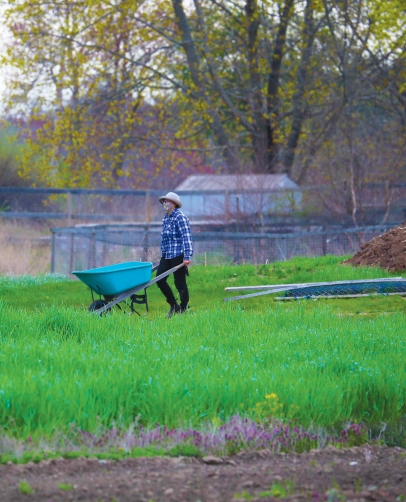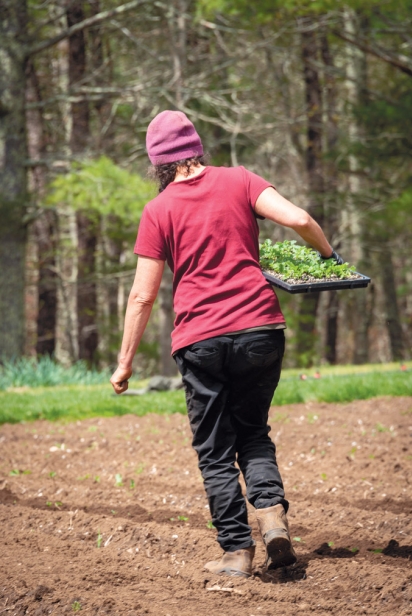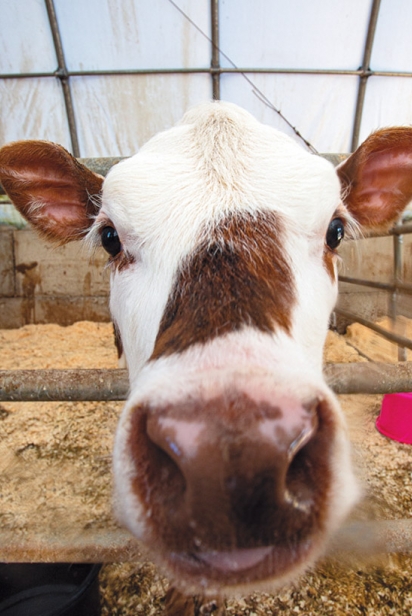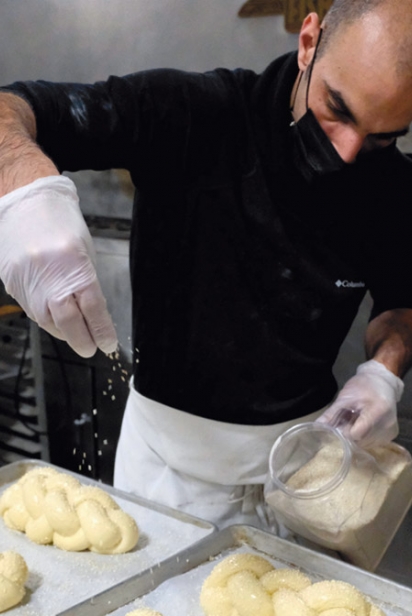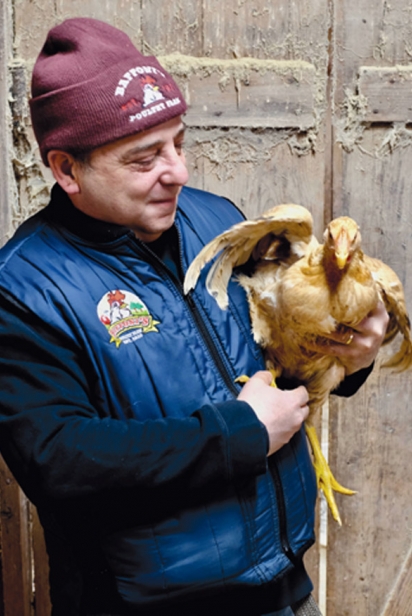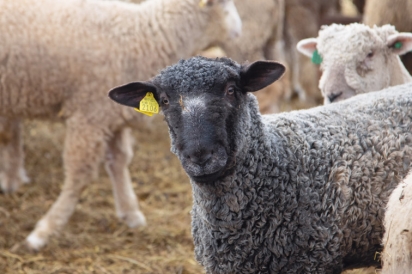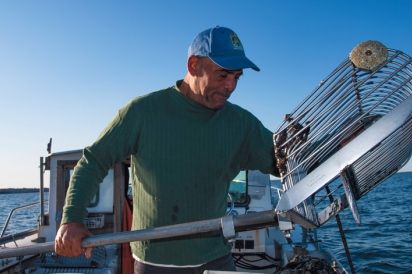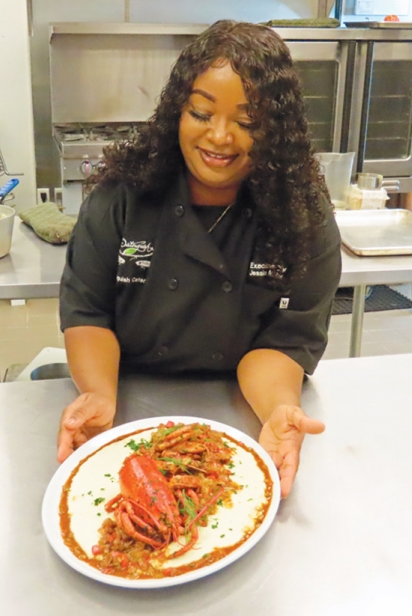FoodWorks Celebrates Rhode Island’s Resilient Food Producers
Photos By Members of The Wickford Art Association
The Wickford Art Association’s Exhibit of Food Photography plus a Food and Art Market—for All to Enjoy!
Route 102 runs like an artery through some of Rhode Island’s greenest pastures. Whether driving north or south—or even east and west, if in Exeter—102 takes you through some of the Ocean State’s more rural areas, which can feel far removed from the coast even if they aren’t really that far apart.
Just off 102 to the north, in one of the state’s highest regions, sits Hopkins Southdowns, a sheep farm that has been in the same family for several generations. The farm features a sprawling 52 acres, with a central green pasture. The terrain is carefully overseen by Billy the Guard Llama, a tall and fluffy creature the color of dark chocolate, with long yellow teeth and a propensity for spitting. It’s Billy’s job to look after the dozens of sheep housed on the farm, rotating between a series of barns and fields.
The property also includes the homes of Debra and Donny Hopkins and their daughter, plus a small store where customers can buy their local lamb right from the farm, in a variety of cuts, all processed in New Hampshire. The Hopkins family also sells their lamb at the Hope Street Farmers Market on Saturday mornings, the Farm Fresh Market Mobile and directly to several restaurants in Providence and Newport.
If you leave Hopkins Southdowns and drive south on 102 toward Hope Valley—eventually veering in the direction of Arcadia Management Area, following a few wooded and winding roads that lead over a small wood bridge and past a shooting range—you’ll reach a red gate that leads to Arcadian Fields, an organic farm located on 25 acres that also hosts the longtime home of Diana Kushner and Steve Smith.
Hopkins Southdowns and Arcadian Fields are among nearly 30 farms and food producers to be featured in FoodWorks, an upcoming exhibition at Wickford Art Association (WAA) in North Kingstown. The association paired each producer with a photographer (16 association members), each of whom was tasked with taking photos to capture details of working life, primarily through spring and into summer.
Among those producers featured are oyster farmers, a quahogger, craft brewers and local vintners, bakers, coffee roasters, confectioners, as well as a number of other animal and vegetable farmers around the state.
The results of this project, done in partnership with Edible Rhody, will be on display starting in September at the Wickford Art Association’s gallery in North Kingstown. The plan is for a festive food and art outdoor market to coincide with the exhibition, so visitors can shop and interact with the producers featured.
Debra Hopkins has been raising sheep since she was a young girl attending 4-H events, which is how she met her husband many years ago. She went on to study livestock agriculture at the University of Connecticut, and now oversees the farm and also serves as national board secretary for the Dorset breed of sheep, often traveling to sheep shows and sales (in pre-pandemic times). “I was able to go to college for my passion and it ended up being my life,” she says.
Before she and Donny settled on his family farm, they worked as shepherds in the Midwest, moving from place to place. “We always had our sheep with us, wherever we went,” Debra recalls. “We never stopped raising our own.”
John Pitocco was paired with Hopkins Southdowns, which is not too far from his home in Glocester. No stranger to photographing farms and barns, he had never before photographed this location; Pitocco also founded a photo arts group at WAA some years ago. At one point, while gathered in the store with Debra talking shop, he left abruptly to photograph the sheep as they were let out into the central pasture. “The light is so nice right now,” he says, dashing out the door. He also kept his eyes on Billy, trying to capture him with his ears up—the sign of a relaxed llama—and without being spit on, all of which gave Debra a good laugh.
Over at Arcadian Fields, the nearly 175-year-old house, a charming shade of teal with pops of red and purple, is surrounded on all sides by farm life: There is the big barn storing equipment and gear, adorned with solar panels and and a weathervane; the greenhouse where seedlings are sprouted before being planted in early May; rows of herbs and rhubarb; a field of kale and collards being grown specifically for distribution to food banks through Hope’s Harvest; more fields for growing produce that will be picked as part of the CSA, including rows of wildflowers; and a sprinkling of flowering trees, some planted by Kushner after moving to the property in 1998, and some already there, like the big apple tree, which was in all of its magenta blooming glory under a “beautiful robin’s-egg-blue sky” when she first visited the farm one May many years ago.
“On a sunny day, if you sit under this tree, the hum of the pollinators is insane,” Kushner says. “How do you leave a place like this?”
Cindy Wilson, the North Kingstown–based photographer paired with Arcadian Fields, was looking forward to getting out to the farm in time to see the apple tree blossom, and snapped a few photos of it framing the fields.
“It’s not just the buildings, it’s the place, it’s the purpose,” Wilson says of what forms the farm’s essence, explaining she was especially taken with images of bare hands massaging soil, preparing it for growth. “They’ve carved this farm out of a state park … it’s nestled into a very obscure part of Rhode Island—and yet it has its own life.”


